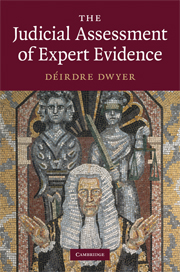Book contents
- Frontmatter
- Contents
- List of figures
- Preface
- Table of legislation
- Table of cases
- Introduction
- 1 General epistemological issues
- 2 Expert evidence as a special case for judicial assessment
- 3 Making sense of expert disagreement
- 4 Non-epistemological factors in determining the role of the expert
- 5 Assessing expert evidence in the English civil courts: the sixteenth to twentieth centuries
- 6 Assessing expert evidence in the English civil courts today
- 7 The effective management of bias
- Conclusion
- Appendix 1 Part 35 of the Civil Procedure Rules 1998
- Appendix 2 Tables of pre-1800 civil cases involving expert evidence
- Bibliography
- Index
- References
1 - General epistemological issues
Published online by Cambridge University Press: 01 July 2009
- Frontmatter
- Contents
- List of figures
- Preface
- Table of legislation
- Table of cases
- Introduction
- 1 General epistemological issues
- 2 Expert evidence as a special case for judicial assessment
- 3 Making sense of expert disagreement
- 4 Non-epistemological factors in determining the role of the expert
- 5 Assessing expert evidence in the English civil courts: the sixteenth to twentieth centuries
- 6 Assessing expert evidence in the English civil courts today
- 7 The effective management of bias
- Conclusion
- Appendix 1 Part 35 of the Civil Procedure Rules 1998
- Appendix 2 Tables of pre-1800 civil cases involving expert evidence
- Bibliography
- Index
- References
Summary
1.1 Introduction
Everyone is bound to cooperate with the judicial authorities with a view to procuring the manifestation of truth.
These rules shall be construed to secure fairness in administration, elimination of unjustifiable expense and delay, and promotion of growth and development of the law of evidence to the end that the truth may be ascertained and proceedings justly determined.
This book is concerned with how judges seek to the best of their ability to form justified beliefs about the truth where at least some of the evidence on which they must rely is the evidence of experts. It can thus be seen as occupying a space within applied philosophy, in the area of epistemology, as well as within the law relating to evidence and proof. Specifically, it concerns legal rather than classical epistemology. Classical epistemology is concerned with how individuals form knowledge and justified beliefs (Section 1.2). However, in relation to the judicial assessment of expert evidence, this would require that we imagine the judge sitting in splendid isolation, imagining and obtaining whatever information she decides is necessary to decide accurately the facts that lie behind a case. Instead, the judge undertakes her fact-finding work within the context of the legal process, and in particular in the context of the rules and practices of evidence and procedure. Legal epistemology entails fact finding, and belief justification, in a social context.
- Type
- Chapter
- Information
- The Judicial Assessment of Expert Evidence , pp. 9 - 73Publisher: Cambridge University PressPrint publication year: 2008



